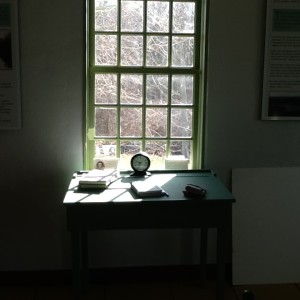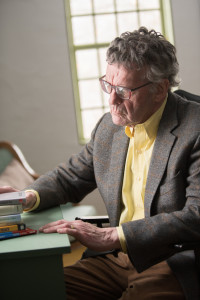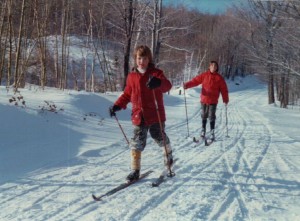By Donna Marie Przybojewski
“Recalled this evening, with the aid of Mother, the various houses (and towns) in which I have lived and some events of my life. Born, July 12, 1817, in the Minott House, on the Virginia Road, where Father occupied Grandmother’s thirds, carrying on the farm. The Catherines the other half of the house. Bob Catherines and John threw up the turkeys. Lived there about eight months.” Journal, December 26, 1855
Whenever I use the Writer’s Retreat located in the birth room at Thoreau Farm, there is a protocol I follow. After organizing my books, journals, and writing utensils, I sit at the replica of Henry’s green desk and turn to face the wall where the bed would have been placed in the room. 
I then reflect on what the day of Henry’s birth might have been like. As we prepare to celebrate the bicentennial of his birth, it is good to remember that at one time, Henry was not the naturalist, philosopher, and social activist that the world would come to know. Henry was not a complex dichotomy on the day of his birth, but an infant cradled in the arms of his mother, Cynthia.
As a mother, I am drawn to Cynthia as I imagine that day. When David Henry, as he was known then, was placed in her arms after birth, what joy she must have felt cradling her new son. I surmise that she counted his fingers and toes, not foreseeing that a few years later, he would be missing one toe due to his carelessness with an ax. I am grateful that mothers cannot foresee all the dangers their children will encounter as toddlers and somehow survive.
Cynthia probably kissed his face and saw the beginnings of a prominent nose and clear blue eyes. Did he focus on her and the room as my own children had done? At that time, she could not have imagined what those eyes would see with such vivid detail, not only the beauty of the natural world, of which she was so fond, but that her son would view with such clarity the wrongs that needed to be corrected in the world. Did she try to smooth a wild mess of downy baby hair growing in every direction? She would inhale David Henry’s baby smell that all mothers relish because it was too soon for him to smell like the woods with its mosses and pines. That would come a number of years later.
I feel a kinship with Cynthia. While embracing her tiny son, she probably had great hopes and plans for his future success evident by the fact that she promoted his education as he grew. She, as most mothers, would have desired happiness and a fulfilling life for her infant.
Also, I wonder if four-year-old Helen and two-year-old John ran into the room to see their newborn brother. Were they like my daughter, Ruth Rachel, who always insisted that she wanted a baby brother and examined my son, David, with the intensity of a physician making sure he was her baby brother when he was born? What were Helen’s and John’s thoughts? Was there a bit of jealousy on the part of Helen being old enough to understand the full meaning of having an addition to the family? Was she anxious to hold her new brother and touch his fingers? John, however, was too young to realize the impact he would have on David Henry’s life and the void he would leave in his brother’s heart due to his early death. He had no idea of the memorable camping trip they would share together that would be immortalized in a book.
Henry himself took pride in his stoic quality on the day of his christening. He proudly admitted he did not cry. There are other stories of Henry not expressing emotion, one being when his pet chickens were taken to the butcher or when he was accused of stealing a knife and he uttered not a word in his own defense except stating he did not take it. So, I imagine Henry did not fuss much, but took in his new world with silent contentment.
Being a good mother, Cynthia had a strong relationship with her brood as reflected in the many memories that Henry relates about his childhood. He inherited his love of nature from his mother, who took her family to the woods to imbibe in nature and cook their supper. It was she, in fact, who brought Henry to Walden for the first time. Did she even realize what an impact that made on his life and the importance the Pond would be throughout his life? She would even share stories of her childhood as Henry recalled in his journal when she spoke of sitting on the porch step of the farm where he was born. She related to him that as a little girl on that very farm, she would listen to the sounds of the night. Thus, she perpetuated the love of nature in her son.
Cynthia bought candy and treats to fill her children’s stockings at Christmas, only to have the illusion broken by a little girl who told young John and David Henry that she saw their mother purchasing the items and that there was no Santa Claus. Mothers everywhere can relate to a feeling of sadness when such innocent fantasies disappear.
Then, as all children eventually do, they grow up.
I cannot help but believe that Cynthia treasured all childhood memories in her heart while beaming with pride at the young man Henry was becoming, and when he became that adult, she had to call him by a new name, Henry David.
When he built his tiny home at Walden, it seems that she did worry about him. I can relate to her feelings of fear of how he would manage to take care of himself when my son moved to his own living space. So, when others find fault with Henry when he took her pies and cookies or say he took advantage of his mother’s goodness when he brought home his laundry for her to wash, I just chuckle. As a mother, with one child who has left the nest, it is a privilege to still take care of his simple needs. Just as my mother shared her love for me with her cooking, so, too, do I express my love for David by making sure his refrigerator is stocked. So, I believe that Cynthia shared that common thread as a mother with me.
Then, there is the issue of Henry moving back home and living there for most of his adult life in the yellow house. As a mother with a grown daughter still living at home, not by need, but by reason that she enjoys being with her family, I imagine Cynthia breathing a sigh of relief when Henry returned from an evening saunter especially during inclement weather, and she heard his footsteps going up to the garret as I do when my daughter returns late in the evening. Worry is part of the nature of being a mother no matter the age of the child. Cynthia, most likely, was no different.
I am certain that Cynthia felt the utmost pride in Henry. How could she not relish in her son’s achievements as a writer and a lecturer? She also must have appreciated his support for her concern for social justice. Following her example, Henry supported the abolitionist movement and demonstrated by word and action that injustice was a moral offense of society. Henry had learned well from his mother’s example. What mother could not take pride in that?
What we need to remember, and one of the most painful things that I reflect upon in the birth room is the fact that Cynthia suffered much. No mother should experience the death of a child, but she buried two of her children prior to Henry. How much more she must have been drawn to Sophia and him. As a mother who almost experienced the death of my son prior to birth, I can empathize the ache and unbearable breaking of the heart that she felt. Fortunately, my child lived, but I still share that bond with her. Then, the agony of seeing Henry during his final stages of tuberculosis when he could no longer take his daily walks. Knowing how he needed the outdoors for his own emotional health must have caused her such agony that she probably would have given her own life for his health. Such is the love of a mother. She probably remained strong before her family, especially Henry, as I did when I thought my son would die, but in the quiet of her room, she cried silently because of the final illness her son was facing.
As Henry took his final breath, Cynthia most likely remembered his birth when he took his first breath in her arms. As he lay dying, she was there to cradle him as he took his last. There was nothing that she could do to help him only be there with her loving presence.
At the moment of his death, could Cynthia in her deepest grief have possibly imagined the influence her son would have on the world and how many individuals would be drawn to him and his words in future generations? Could she even imagine that people one hundred fifty-five years in the future would continue to mourn his death just as she was mourning? Did she realize that because she gave birth to him that he would have a positive impact on the lives of thousands and would be influential in preserving the natural world that she so loved? How would she have felt if she knew that his 200th birthday would be celebrated around the world? Would knowing this have brought her some solace?
Therefore, as I look at the space where Henry was born, I feel a kinship with his mother and share her joy as well as sorrow. In this most special of rooms, I believe that one must reflect on Henry David Thoreau’s birth prior to any other activity. It is good to remember that Henry’s life and words are because of Cynthia Dunbar Thoreau, a mother who influenced her son well. So, as we prepare to celebrate the 200th anniversary of Henry David Thoreau’s birth, let us feel indebted to Cynthia for giving the world this iconic author, philosopher, and naturalist who was at one time her infant son.
Donna Marie Przybojewski is the author of three children’s books,
Henry David Thoreau: A Discussion Starter Coloring Book, Henry David Thoreau, Who Can He Be?and Henry David Thoreau Loved the Seasons. Donna teaches junior high school and is a Thoreau Society Ambassador for the Thoreau Bicentennial.


